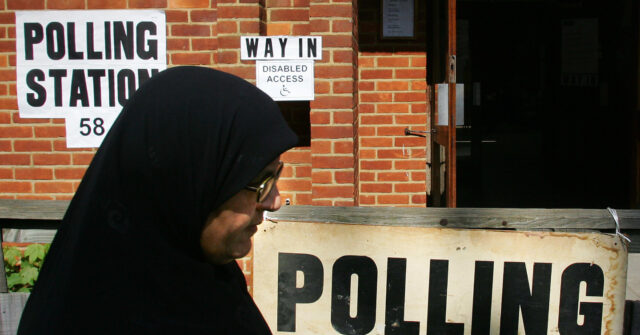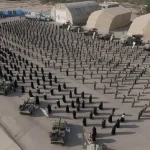
Nigel Farage lamented that "sectarian politics is here to stay" as candidates running on the issue of Gaza won local elections in Britain.
The post Farage Warns ‘Sectarian Politics Are Here to Stay’ as Muslim Voters Back Pro-Gaza Candidates appeared first on Breitbart.

Brexit boss Nigel Farage lamented that “sectarian politics is here to stay” in Britain as dozens of Islamic candidates running on the issue of Gaza won local elections across the country this week.
While the left-wing Labour Party was the clear winner of the local council and mayoral elections held in Britain on Thursday, with Rishi Sunak’s Conservatives continuing to flounder, there is increasing concern over Muslim voters abandoning Labour in favour of single-issue candidates.
According to an analysis by The Telegraph of election results, in areas with the highest proportion of Muslim voters, such as Blackburn, Bradford, Pendle, Oldham, and Manchester, the Labour Party saw its support fall by an average of 25 points.
Labour Party leader Sir Kier Starmer’s attempts to distance himself and his party from the anti-semitism scandals which plagued his predecessor socialist Jeremy Corbyn has come at the cost of Muslim voters — traditionally one of Labour’s key voting blocs — many of whom abandoned the party in favour of independent candidates who centre their campaigns around the conflict in Gaza.
Commenting on the shift in the British political landscape, Brexit’s Nigel Farage said: “There have been no democratic elections in Gaza for nearly 20 years, yet Gaza is being voted on in English towns and cities. What a mess we have allowed ourselves to become.”
“Sectarian politics is here to stay. We now have Islamic voting in Britain, which over the course of the next decade will give Labour a very, very big headache,” Mr Farage added.
In a highly symbolic moment, Green Party candidate Gipton and Harehills seat for the Leeds city council, Mothin Ali, was filmed during a victory celebration shouting “Allahu Akbar” in front of a Palestinian flag while proclaiming that his election was a “win for the people of Gaza”.
Ali said that his constituents were “fed up” with the Labour Party, adding: “We will not be silenced. We will raise the voice of Gaza. We will raise the voice of Palestine. Allahu Akbar!”
I have predicted sectarian politics in the UK for some time now.
Well, here it is for all to see. pic.twitter.com/f4q4a0zDhk
— Nigel Farage (@Nigel_Farage) May 4, 2024
Separately in Walsall, Naheed Zohra Gultasib, who quit the Labour Party in November in protest against Sir Keir Starmer’s unwillingness to demand a ceasefire in Gaza, managed to hold on to her seat in the Pleck ward.
“This is for Gaza, this is for Palestine,” Gultasib said. “You showed [Labour] that they cannot take your vote for granted.”
According to The Telegraph, throughout nine local authorities with a 15 per cent or higher Muslim population, the Labour Party lost 18 seats, while independents picked up 18 seats in the same areas. In the Blackburn ward of Shear Brow and Corporation Park, which has a Muslim population of 83 per cent, Labour saw a stunning decline from 91 per cent of the local vote in 2021 to just 27 per cent this week.
The success of Gaza-specific candidates in the local elections comes in the wake of veteran leftist-populist campaigner George Galloway of the Workers Party of Britain winning a seat in Parliament in the Rochdale by-election on a pro-Palestinian platform. Galloway’s Workers Party of Britain won four seats on Thursday, coming out on top in two seats in Rochdale, one in Calderdale and one in Manchester, the BBC reports.
The co-founder of JL Partners and a former Downing Street pollster, James Johnson, said that there are “fledgling signs of a reconfiguration in British politics” in which Muslims are “very different issues to the wider public”.
Johnson highlighted a recent survey conducted by JL Partners for the Henry Jackson Society think tank which found that one in four British Muslims listed the Israeli-Palestinian conflict as their top election issue, compared to just three per cent of the British public as a whole.
It is still unclear how much of an impact this will have on Labour’s prospects of winning the next general election, with Johnson saying: “The big caveat is that these places tend to be safe Labour seats and the general elections tend to be more about who will be the next prime minister. Those two combined might mean that in seat terms, it doesn’t have a huge effect.”
‘This is For Gaza’: Far-Left Populist Wins UK Special Election With Appeal to Muslim Vote https://t.co/zMGRDb1IHQ
— Breitbart London (@BreitbartLondon) March 1, 2024





